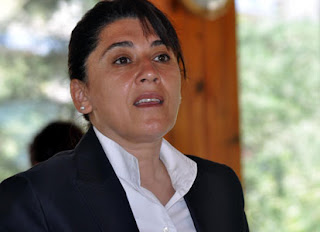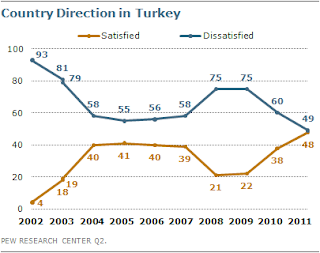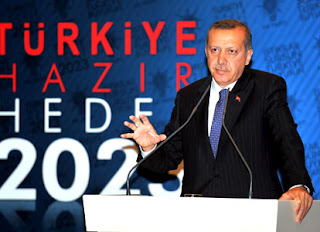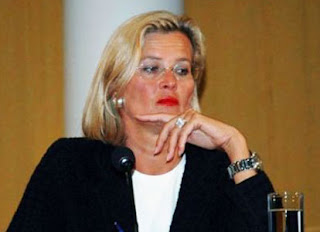Sunday's elections created what is perhaps the most representative parliament in the history of the Turkish Republic. Of the 87% of eligible Turkish voters who showed up to cast ballots, only 4.4% voted for parties were not ultimately elected to parliament. This is down from 13% in 2007 and 32% in 2002. This representation problem has been a function of small political parties being unable to meet the country's high 10% threshold required to enter parliament. (The Kurdish BDP is an exception to this rule since it has not run as a political party, but rather chosen to run candidates as independents. A difficult feat to pull off, the BDP won 36 MPs this parliamentary election cycle.)
However, though there are now few political parties in parliament, this does not mean Turkey is necessarily any less divided. In fact, each of the four political parties now represented have unique constituencies and platforms that do not necessarily square with each other or facilitate compromise. As the AKP vows to seek compromise and civil society input as it moves forward with re-drafting the country's 1982 constitution, which was drafted in the shadow of a dramatic coup in 1980, it is unclear just how successful it can and will be.
Assessing the BDP
Cengiz Candar argues in today's Radikal that what a " BDP opening" is needed, meaning that the AKP must accommodate the voices and politics of the Kurdish nationalist party. At the same time, Candar, who is joined by other liberal public intellectuals who support Kurdish political, civil, and cultural rights, argues that the BDP has not shown itself to be a positive player when it comes to adopting the conciliatory politics required to reach a solution to the age-old Kurdish problem.
As Henri Barkey elucidated at an event at the Carnegie Endowment today (podcast here), the BDP's victory is impressive in that it resulted not only from the support it receives in the southeast (and in Kurdish areas throughout the country), but also from its tremendous capacity to organize. Successfully unning independent candidates for parliament is no easy task, and basically required the party to apportion its support for specific candidates running at the provincial level and then organize voters to elect these candidates. For example, in Diyarbakir, where support for the BDP was high, BDP supporters were divided between the number of candidates the BDP thought it could successfully run. Such a strategy requires the BDP to perform a complicated electoral math in determining just how many candidates it can elect in the context of a complicated electoral system and successfully rally the vote behind these independent candidates.
Though the BDP's success should not be underestimated, it should also not be overplayed. As Candar explains, though the BDP has gotten better at electoral engineering, political support for the party has not necessarily increased. Further, it should not be forgotten that a significant number of Kurds voted for the AKP despite its heavy nationalist rhetoric (Candar estimates 42%). Had the AKP not run a nationalist campaign in an effort to run the MHP into the ground, the result might have been different. Candar also points attention to the factions the BDP has managed to bring together (for example, bringing leftists together with staunch Kurdish nationalists and pro-Kurdish conservatives like Altan Tan and Sereafettin Elci). According to Candar, though this coalition-building is taking place at the elite level, the BDP has not succeeded in doing so among voters.
Trouble Brewing
In the days after the election, the BDP used this mammoth victory to call for the release of PKK terrorist leader Abdullah Ocalan and direct negotiations with the PKK, actions sure to infuriate the vast majority of Turkish votes. In doing, the BDP is alienating itself from the larger electorate and adopting a divisive politics sure to further fuel the conflict.
At the same time, the AKP has paid little attention to the Kurdish problem, the existence of which the party denied during the campaign, and is instead focusing on moving onward with business as usual. The two positions combined create the conditions for a political crisis, which could come soon given that six of BDP's deputies are currently in jail and their eligibility to hold seats in parliament still up in the air.
Chief among these is Hatip Dicle, who was convicted in 2009 for disseminating PKK propaganda and whose candidacy was at the heart of the riots that enfolded at the end of April when the High Election Board (YSK) invalidated the candidacies of 11 BDP candidates (see April 21 post). On June 9, just three days before the elections, the Supreme Court of Appeals upheld Dicle's conviction. Though it was too late to remove his name from the ballot, the High Elections Board will decide whether he is able to serve in parliament.
The six BDP candidates currently jailed as part of the KCK operations (and who are awaiting trial) include Gulseren Yildirm, Ibrahim Ayhan, Selma Irmak, Faysal Sarayildiz, Kemal Aktas, and Dicle. Dicle's case is special since he is not only jailed and awaiting trial for alleged membership in the PKK (KCK), but has been convicted previously and been unable to attain the necessary paperwork required to allow him to enter parliament. The Constitution bars convicted persons from holding parliamentary office. (In addition to the six jailed BDP candidates, two CHP candidates and one MHP candidate, both recently elected, are also currently detained (for their role in Ergenekon).)
Meeting in Diyarbakir yesterday, the BDP called for the release of all six elected members and demanded the release of Ocalan. If the release of the six was not controversial enough, combining such a move with Ocalan's release is not politically savvy nor helpful for the peace process. Reaction in the Turkish press, nationalist and otherwise, has been harsh, and will likely only increase in intensity should a crisis with Dicle come to a head.
Will the AKP Seek Compromise?
Speculation is still high as to whether Prime Minister Erdogan will seek a presidential term in either 2012 or 2014 given the party's successful election result. While some observers argues the party's loss of seats and new need for compromise when it comes to amending the country's constitution renders null the possibility of a powerful Erdogan presidency, others conjecture the AKP will still be able to find the support it needs to change the constitution and empower Erdogan.
The prime minister has announced that he will not run for parliament again, and the AKP's current by-laws prevent him from being appointed to another term as prime minister. CSIS' Bulent Aliriza writes
The new constitution seems certain to usher in a presidential system, and it is clear that Erdogan intends to run for the presidency, either in 2012 or more likely in 2014. If he were to choose the latter date, he would then be in a position to implement his “Target 2023” election manifesto through the centennial of the Turkish Republic as president. However, the inability of the JDP to obtain 330 seats, which would have enabled Erdogan to get public approval for a new constitution in a referendum, presents an obstacle that needs to be overcome.Apart from the question of Erdogan continuance as the leading force in Turkish politics, the more immediate question is whether and just how the AKP will seek compromise and consensus on the constitution, especially given the likelihood of conflict over the jailed opposition candidates who have just been elected from parliament.
Again, a key question here is whether and how the party will attempt to repair the bridges it has burnt with the large number of Kurdish voters to whom the party turned its back. Though the AKP failed to push the ultra-nationalist MHP beneath the 10% threshold, according to Barkey, any increase in the AKP's number of voters (above the 50% of the country who supported it in this election) will come from nationalist voters.
Getting these votes is dependent on how the party treats the Kurdish issue, and should it be intent to continue its nationalist rhetoric, the BDP opening for which Candar hopes is simply not going to come to fruition. At the same time, the AKP has expressed intent to negotiate with the CHP and the MHP, and there are those in the party who realize the necessity of dealing with the BDP, however unsavory and threatening its politics. At the party's parliamentary group meeting today, Erdogan re-affirmed his intent to move forward with the constitution and said he would personally supervise negotiations with the opposition and engagement with civil society.
Just how all of this will happen is yet to be seen, especially given that the next few weeks could prove difficult if the courts and the YSK prevent the release and entry of those elected candidates currently jailed. And, while Turkey might have a more representative parliament, a less divided country it is not.






















